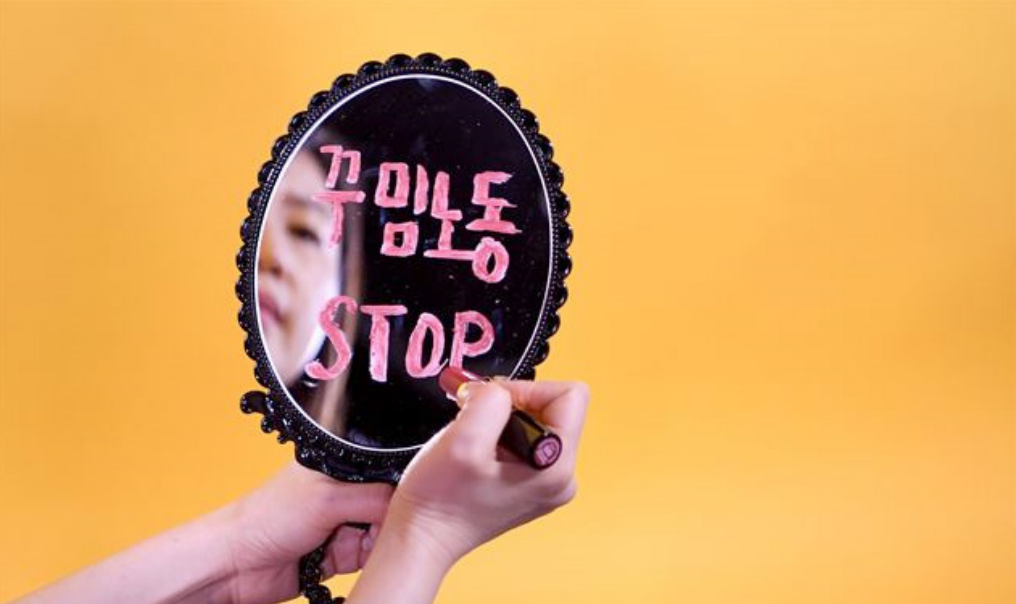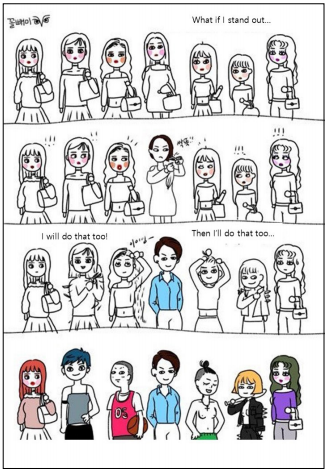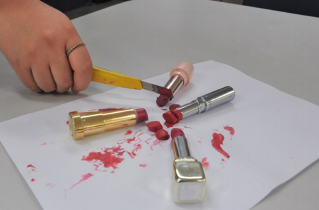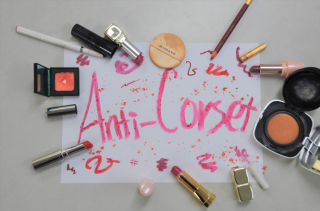
PHOTO FROM HANKOOK ILBO
Stop Labor of Embellishment
“What happened to your hair? Are you sick? Did you split with your boyfriend?” These are very common questions others ask whenever one cuts their hair or does not wear makeup. The person likely cut it because they did not like long hair any longer or felt burdened to put on makeup one day. The questions about ‘why’ are likely annoying and the cause of much irritation. Long hair, rosy cheeks, big round eyes, and the wearing of skirts and high heels are the expectations of ‘femininity’ in the society. However, women are starting to take off their ‘corsets’ of ‘femininity’ and enjoy freedom from it. What has brought about this change?

#anti_corset (#탈코르셋)
Have you ever watched <Cinderella(2015)>? If you did, you might have seen the 20-inch waist of Lily James in sky blue dress. To make such a waist line, she needed to wear a corset that tightened her torso. In the past, some corsets were so tight that one would pass out. Many think the corset was left behind in the Middle Ages, but there is a modern version of the corset that is considered by some to be an essential aspect of being feminine along with items such as makeup or being thin. Recently, women have begun to reject these things, and it is being called ‘anti-corset movement’. The opinions about the range of anti-corset are diverse, but most women who participate in the anti-corset movement stand for the refusal of ‘labor of embellishment’ or adorning themselves with makeup or elaborate clothing. This refusal has become the common denominator of the anti-corset movement.
The anti-corset movement has spread for two reasons. One is related to the ‘Demonstration against Unjust Investigation of Illegal Shooting’. Last May, a photo of a nude male model was leaked online. The suspect has been arraigned, and it happened in 25 days after the case was brought to light. The investigation of the case provoked heated anger among many women because the case saw faster investigation than the case of illegal shooting of women just earlier. The anger also sparked on great interest in stereotypical images of ‘femininity’ in Korean society. The second reason relates to the post about the anti-corset movement on Social Network Service (SNS). For instance, the beauty YouTuber ‘Lina bae’ posted a video confessing her corset while supporting anti-coreset movement. This video reached over 2 million views as of July 16. This video and others have inspired many women to post anti-corset movement messages on their personal SNS accounts. There are over 6,000 anti-corset hashtags on Instagram as of August 13, and this number is on the rise. While not all the supporters have cut their hair or refused to wear makeup, the key is that they are showing their support for the anti-corset movement in their own way.

We Need to Talk about Anti-Corset
The purpose of the anti-corset movement is to set women free from social pressures based on gender. However, the anti-corset movement has also brought out its work as reverse corset. Cutting one’s hair short or not putting on makeup are among the most common shows of support for the movement. However, some people say the anti-corset movement is a means of coercion. Discussions are taking place all over SNS. For instance, YouTuber Grin Park posted the video entitled ‘The Reason I Feel Uncomfortable with the Anti-Corset Movement’, which expressed her negative view towards the movement. Park claimed that some people are more comfortable with long hair, so anti-corset movement can be pressure for some people. Professor Yun Kim Ji-yeong at the Institute of Body and Culture said, “The Anti-corset movement is not about having women cut their hair short or even women not wearing skirts, instead of pants. It is about asking ‘Do Korean women all have to look the same to be considered beautiful?”1) Hence, the anti-corset movement is about being free from a standardized concept of beauty.
As mentioned earlier, people have different opinions about the anti-corset movement. While some people think the need to meet society’s standards of beauty are laborious, others don’t. For example, there are those who argue that caring for one’s appearance is for one’s self confidence and comfort. Opponents argue that this feeling of comfort is the result of gender socialization. In other words, gender roles have become so solidified in society that people actually feel comfortable in a corset. The anti-corset movement hopes that people see their work towards beauty as a matter of choice not fulfilling society's expectations. It would be beneficial to reflect on the question, 'Would women do the same thing if they were men?’ The answers to this question should be discussed fully to make sure all aspects of the issue are considered.

Finding ‘Me’
Though debate exists on the anti-corset movement, it has brought about positive change. First, because of the anti-corset movement, women have begun to reflect on themselves critically. Society has set the standards of women’s beauty for too long. For instance, there are lots of videos on beauty YouTube clips with similar topics such as ”How to Deceive Your Boyfriend with Natural Face Makeup in 5 Minutes”. However, with the rise in interest of the anti-corset movement, women have started to accept themselves and reject the standards set by society. The key to the movement is to accept oneself as they are. It’s all about loving oneself without judging themselves with social criterion. Kim Myeongji, Department of Business Administration ’17, who posted her anti-corset comment on her Instagram account said, “Before participating in the anti-corset movement, I loved to be complimented my looks. I looked for my appearance flaws in order to meet social expectations. I started to lose respect for myself. However, after joining the anti-corset movement, I learned to accept and love myself.” Through the anti-corset movement, women are free from set standards and not adhering to those standards any more. Though not all women are participating in the anti-corset movement, they have started to reflect on the ideas behind the movement.
The movement has given people the opportunity to think about social regulation. Under a patriarchal system, women are ‘objects’, not subjects. The social status of women in Korea has improved and they have gained political power, but they are still treated as objects. This is easy to find in advertisements in Korea, where women are usually seen having long hair and being exceptionally slender. Cho Han Haejoang, emeritus professor at Yonsei University, said, “Under a patriarchal system, women feel pressured to fit into society’s expectation of their gender and feel discouraged from attempt to initiate change or enter into position of power in order to make change. Society has even imprinted the notion that one who is not ‘pretty’ is a loser.”2) The anti-corset movement has made women reflect deeply on whether it is appropriate to judge women by social norms. It made people feel the necessity to collapse the patriarchal rules. Moreover, it gave people an opportunity to reconsider lookism, a pervasive thought in Korean society. By telling that it is not right to judge others by appearance through the movement, women will stop being objects. In other words, the anti-corset movement is breaking down fixed ideas of ‘femininity’.

“This Is Me”
“Finding myself and being comfortable with myself are the ideas of the anti-corset movement,” Na Young said on her Facebook account. Society has viewed women through men’s eyes, created standards of beauty for women, and dictated that women follow social norms set for them. As a result, women have had to wake up early each morning to put on makeup, do their hair, and others all for the sake of ‘femininity’. Though many claim they are not doing those actions because of society standards, it is not actually a matter of choice. The anti-corset movement is still in a movement in progress, so it is hard to know what lies at the end of the anti-corset movement. The point of the anti-corset movement is to ask people to reflect on society expectation and make changes. And this is the true meaning behind the anti-corset movement.
1) Hyun Hyeran, “Posting ‘Anti-Corset’ Message Ignites Debate on SNS…”No More Valuation Criteria””, Yonhap News, June 11, 2018
2) Hong Sangji, “We Threw away Lipstick and Bras… Women Standing with the ‘Anti-Corset’ Movement”, JoongAng Ilbo, June 3, 2018


